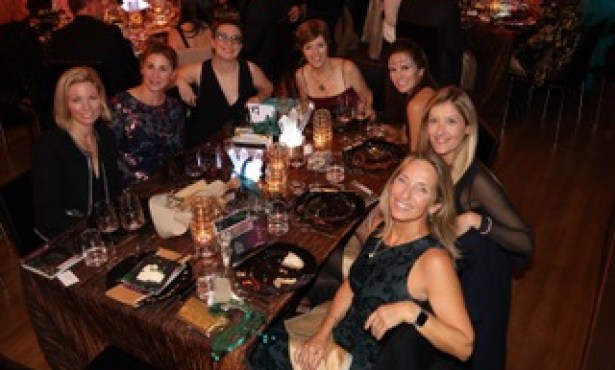As part of its burgeoning global outlook, UC Santa Barbara’s Gevirtz School celebrates International Education Week 2013
The School’s reach extends to 86 countries
Mercedes Fernández Oromendía, a Ph.D. candidate at UC Santa Barbara’s Gevirtz School, has been recently appointed student co-chair of the American Psychological Association’s (APA) Division of International Psychology. This appointment is little surprise as she is currently developing a study looking at how to apply positive psychology interventions to help international students at UCSB with their acculturation process. Originally from Argentina, Oromendía went home this summer, and thanks to Gevirtz School professor Andrés Consoli (former president of the Interamerican Society of Psychology), she was able to observe an intake, participate in supervision, and attend a few classes at a psychology center in Buenos Aires.
“It was an incredible experience and cemented my passion to bridge the U.S., and particularly UCSB, with other countries,” Oromendía says. “It also helped motivate me to apply for the APA position. At this center, they were even using the same book we used in my class here. It became clear that although it is a big world, we have many things in common too. I am now considering doing an internship at this center after graduation to develop my bilingual and bicultural skills and would like to continue opening up communication throughout the western hemisphere.”
Reem Alfrayan, a GGSE international graduate student from Saudi Arabia recently served as a student ambassador for the 2103 US-Saudi Business Opportunities Forum in special recognition for her excellent leadership skills and her commitment to represent Saudi Arabia in a professional and positive manner. A Ph.D. candidate in the Department of Education’s Educational Leadership and Organizations area, Alfrayan’s dissertation is on the self-efficacy of Saudi Arabian businesswomen across generational/cohorts. “Walking the footsteps of great Saudi women leaders who preceded me in greatness is my approach to the empowerment of the new generation,” she says. “Creating new paths for the next generation is my passion. I thrive to reach a key position in promoting and advocating for Saudi businesswomen in the Kingdome of Saudi Arabia. My research interests reflect my profound interest in the empowerment of Saudi Arabian businesswomen through policy reform.”
Oromendía’s and Alfrayan’s experiences are just two examples of the growing global reach of the Gevirtz School. As a way to celebrate International Education Week 2013, November 11-15, UC Santa Barbara’s Gevirtz School is holding two events:
November 12 – Talk/Luncheon: Gevirtz School international students and their faculty sponsors will attend a luncheon featuring a talk by Dr. Isabella Lin-Roark, a clinical psychologist and international specialist at UCSB Counseling & Psychological Services. Afterward, for students will hold breakout sessions to discuss the challenges they have faced as international students in the U.S. and the strategies they have used for success.
November 14 – Campus-wide Reception/Presentations: Gevirtz School visiting scholars, international students, and faculty, and campus and community friends interested in international education will attend a reception featuring short presentations on research.
“I am excited to work with the GGSE community to enhance the visibility and understanding of our strong international efforts that benefit our students’ education and our research efforts,” Gevirtz School Associate Dean Hsiu-Zu Ho comments. “I also look forward to having campus and larger community conversations regarding the globalization of higher education in general, and what that means to the GGSE and to UCSB, specifically.”
Gevirtz School faculty and students are highly engaged in a variety of international projects across the globe including collaborative research, prominent lectures/workshops, teacher/student exchanges, and philanthropic projects. The extent of the School’s internationalization for the 2013-14 academic year includes:
· 29 visiting international students (over 8% of our graduate student population) representing 13 countries across 5 continents;
· 29 visiting scholars representing 10 countries across 4 continents;
· 22 teacher education students (11 UCSB students, 11 international) will be involved in exchanges among, the U.S., Denmark, Singapore, and Switzerland;
· 8 Memorandums of Understanding (MOUs) with institutions across 4 continents.
Ho adds, “I am still gathering information regarding the extent of our faculty’s international activities, but I am impressed that of 26 GGSE faculty members for whom I have this type of information, the global reach of their professional activities already covers 86 countries.”
The faculty work includes such notable projects such as those by Professors Chuck Bazerman, Judith Green, Shane Jimerson, and Jin Sook Lee. Bazerman, Professor in the Department of Education, has taken an active lead in Writing Research Across Borders with tri-annual conferences that have brought together over 500 presenters and 800 attendees from 35 countries. This consortium of writing researchers draws on all disciplines and focuses on aspects of writing at all levels of development and in all segments of society. Green, Professor in the Department of Education, has worked on the steering committee for the International Society for Cultural and Activity Research Conference – or ISCAR 2008 – “Ecologies of Diversities: The developmental and historical interarticulation of human mediational forms,” a conference that included over 1000 scholars from 44 countries. Jimerson, Professor in the Department of Counseling, Clinical and School Psychology, is the co-editor of the Handbook of International School Psychology and on the executive committee of the International Institute of School Psychology. Lee, Professor in the Department of Education, was a 2011-12 Fulbright Senior Scholar affiliated with the Graduate School of Education, Yonsei University in Seoul, South Korea conducting research on current English language immersion programs and English language teacher training policies in South Korea.
Student work is highlighted by a recently initiated four-six week student teaching placement exchange between UCSB’s Teacher Education Program (TEP) and institutions in three countries: Denmark, Singapore, and Switzerland. Unique to the program is the purposeful integration and overlap of teacher candidates’ work in both countries. Twenty-two teacher candidates (eleven from the U.S. and eleven from abroad) will participate in this exchange.
Dean Conoley says, “The campus community has been remarkably willing and able to conceptualize an entirely new process to attract, support, and develop a new generation of science and mathematics teachers. This is a vital step to meeting the overwhelming needs of California schools for highly quality teachers in math and science.”
California and the nation are lagging behind international peers in the production of engineers, scientists, and mathematicians. US students compare poorly in international testing comparisons in mathematics and science. A key problem is the scarcity of well prepared teachers. The UC Santa Barbara effort supports the UC System commitment to produce 1000 science and math teachers annually for California schools.
Dr. Julie Bianchini, a science educator and associate professor in the Gevirtz School, serves as the faculty director of the program. An advisory faculty panel representing mathematics and all the sciences oversees the initiative.


